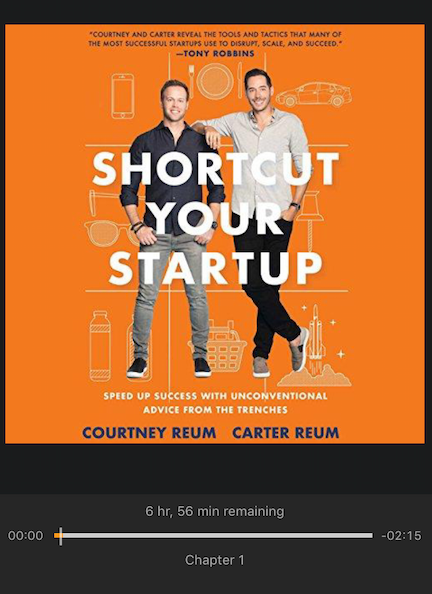Shortcut Your Startup by Courtney Reum and Carter Reum

After seeing this title recommended a few times on my Audible account, I thought it was time that I checked it out for myself. I always like to learn about what other people are doing and what is working well for other people. One of the things that I really wanted to learn was how to build a company efficiently and effectively.
Persuasion is something I always like to learn more about and I believe that Aristotle’s 3 pillars are the most important core pieces of persuasion.
Aristotle’s 3 Pillars of Persuasion
1. Ethos — convincing someone through credibility
2. Pathos — appealing to emotion
3. Logos — persuasion by reason
I loved these questions. I believe that they are essential for anyone who is looking to begin a project. It’s always important to take time before rushing into anything to understand and identify the underlying motives. Why is often just as important, if not more, than what and how.
3 questions before you start anything:
1. What does success look like for you?
2. Why has no one does this before?
3. Why you and why now?
The idea of a hero product is one that I truly appreciated. Offering just one thing is not going to typically cater to all of your markets at all times. As Grant Cardone has taught, it’s important to be able to have something for all people at all times.
Should have one “hero” product which is the core and then use economies of scale to keep overhead as low as possible. Minimal change to products but appeal to many customers.
I enjoyed the comparison that the authors provided here. It’s very valuable, I believe, to understand exactly what the method will be for generating revenue before any revenue is actually generated. As the authors shared earlier, there are questions that are essential to answer before beginning any venture, I believe that this is important also.
It’s important to know if you’re a speedboat and need market share fast or if you’re a sailboat and expand more slowly after developing a core customer base. That should have a major influence on the way you are raising money.
When I was working with a consulting company that worked with startups and investors, I got to see some of this firsthand. It is so so so so important to have these things outlined ahead of time. Things may be unpredictable. Not everyone cares about equity so while the culture may be one of sweat equity if the company is profitable and someone does not desire equity, why give any?
4 equity rules to live by:
1. Treat equity as gold, be cautious when giving it away
2. The pie of ownership is fixed but the value of the company is variable
3. Know who’s motivated by equity and who isn’t
4. Make equity decisions before the company is worth a lot and make the decision as if the company is worth a lot. Have the conversation is earlier and take it seriously.
This is one of the most important questions that I believe can be asked. Everything is negotiable and just because people do things one way today does not mean that they will be doing things the same way forever. People thought horse and carriage was the ideal transportation method — until it wasn’t.
Creative thinking to break out of our regular paradigm:
“If this weren’t true, what then?”
As a company grows, maintaining a customer-first mindset and strategy is valuable and these are just a couple of the ways that companies adapt as their customer base changes.
3 common types of pivots for companies:
1. Market segment pivot, repurpose an existing product for a new segment of customers.
2. Customer problem pivot, solve a different problem for customers, they have an unaddressed issue.
3. Feature pivot, if you notice a customer using a specific feature more than any other, reorient company around that feature.
To go along with the previous point here, I think that this is one of the things that might not always be a priority for business leaders, but it should be.
4 practices to keep in mind when considering iterations and pivots:
1. Honor truth more than commitment
2. Don’t pivot just for pivoting’s sake
3. Be willing to make tough decisions
4. Be aware of taking too much money at the start
100% agree with all these. There’s really nothing I would initially have to add to this list. I cannot even place one above another in terms of importance, they’re all that important to me.

3 tips for winning investors:
1. Show your smarts, prove you understand the industry and can execute the idea the best.
2. Show your passion, tell your story and sell your dream, try to touch their hearts.
3. Show you’re business savvy, exemplify unfair advantages that will set you apart.
People will often misinterpret what others want to do so I agree with the authors that these should be clarified before decisions are made. If the decision-makers are not in the room when the decision needs to be made, there’s going to be a problem.
When making decisions, 3 questions to clarify before making decisions:
1. How will this decision be made? A consensus is usually death for decision making — too time-consuming
2. Who will contribute? Who needs to provide input?
3. When will we decide? When do we need to decide?
Basically, get the kinks out. Learn to drive before you buy a car. It just makes sense. Don’t take the car on the freeway when you’ve never even driven in a parking lot.
3 benefits of nailing before scaling:
1. Minimize risk
2. Create positive word of mouth
3. Sell dreams to investors more easily, increase the likelihood of success
Leading by example is the best way to lead and relentless improvement shows people and members of the team exactly what is expected. Beyond that, as a company is evolving, so then are the goals, but again, information symmetry is essential. The founders need to be completely aligned with the new hires.
For new hires in a startup, set up clear expectations and 30, 60, and 90-day goals and frequent check-ins. Relentlessly improve yourself.
I wrote a deeper-level reflection of this in July of 2019 (linked here). I believe that all of these are important to foster leadership and a truly great team environment. I love the third one most, or maybe the second… either way, this is great. For something more in-depth on my thoughts, check my focused piece here.
5 things great leaders say to their people:
1. “I trust you to do this” this creates loyalty, if you don’t trust them, they shouldn’t be working with you.
2. “When you did X, the effect on me, us, the project, was Y” saying good job isn’t efficient.
3. “I screwed up” taking ownership creates a culture where you learn from failure rather than avoiding or hiding from it.
4. “It’s okay that you screwed up, let’s figure out how to fix this” set the tone for a fail-fast culture, avoid getting angry or blaming.
5. “Be sure to come to me if you have any questions or need anything to get this done” you don’t want people to get stalled because they’re afraid to ask for help.

This book was insightful, meaningful, and valuable. I learned a lot from it. If there was anything that would have made it a little better in my eyes would be more real-life examples. The authors did a nice job of integrating the concepts in specific situations but I think it would be cool to see each thing related to a real-life company example. There were so many great things within this book that I really enjoyed rereading my notes to write this a few months later.
I gave this book a 3.5/5